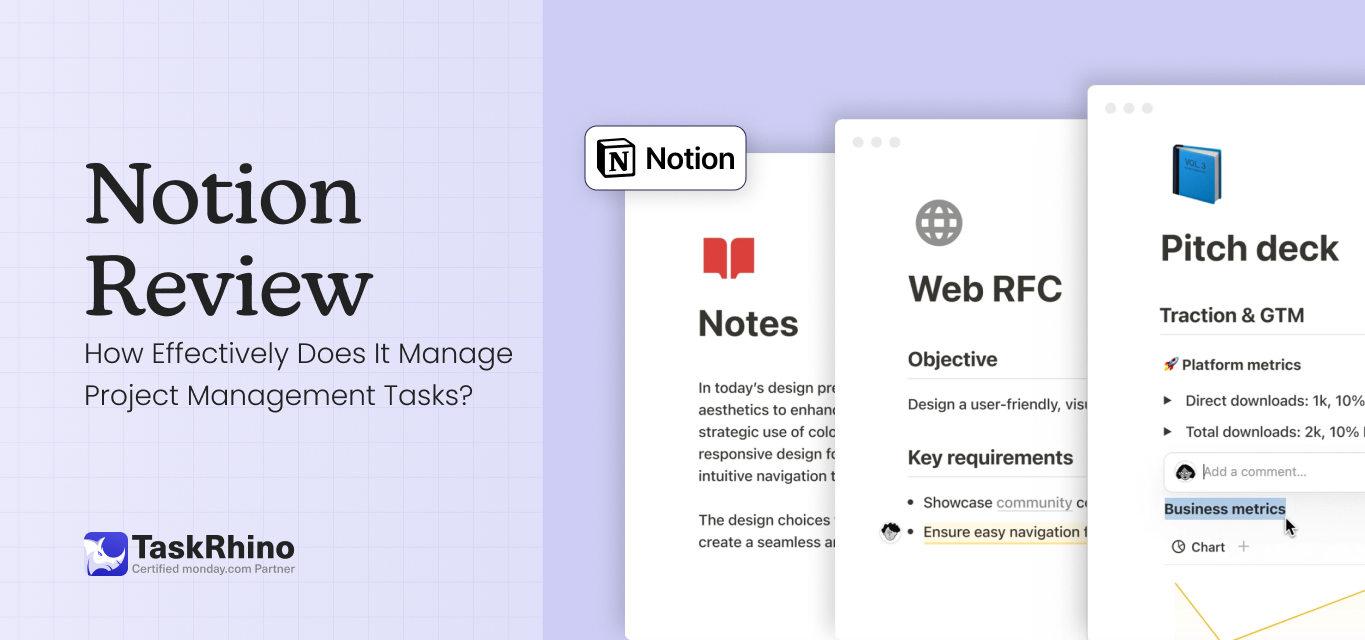
Notion Review: How Effectively Does It Manage Project Management Tasks?
Summary: This blog offers an in-depth Notion review, covering its powerful features, pricing plans, pros, and cons. You will gain insights into how Notion can enhance productivity with tools like databases, templates, and AI, helping you decide if it’s the right choice for your needs.
Productivity tools are supposed to make life easier, but how many deliver?
Notion – with its highly customizable features, has earned a reputation as the ultimate all-in-one solution.
You can use it to manage team projects, organize personal goals, or even track your favorite books. But here’s the question:
Is Notion really the answer to your productivity despair, or is it just another minimalist app with a steep learning curve?
In this honest review of Notion, we will explore the essentials and beyond, helping you see exactly what Notion offers and whether it’s the right fit for you.
We will cover its strengths, potential drawbacks, and real-world scenarios to help you make an informed choice.💡
So if you’re looking for a deeper understanding of Notion or wondering if it’s worth the investment—you’re at the right place!
What is Notion?
Users often describe Notion as a “modular workstation” for productivity, covering everything from note-taking and project management to building databases and tracking goals.
Its building-block design is like a digital toolkit, allowing you to assemble your workspace however you need—whether for personal tasks or team collaborations.
This versatility has drawn users who appreciate having tools like Kanban boards and document editors such as Google Docs and Notion page—all in one—almost like setting up a custom dashboard for their entire workflow.
Features such as taking notes or writing tasks, creating charts, and other add-on abilities make Notion stand out from other management tools.
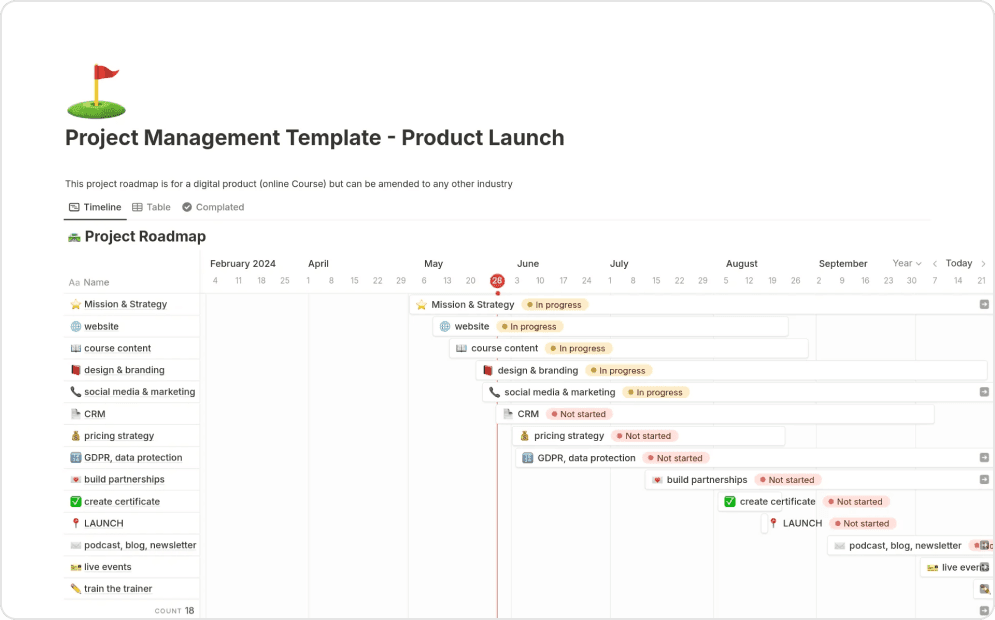
However, while powerful, Notion’s open-ended structure can feel like configuring a complex software suite. Its flexibility brings a learning curve, particularly for those new to such customizable platforms.
While Notion offers many possibilities, specialized project management tools may be more efficient for those who prefer a more straightforward, streamlined approach.
In short, Notion provides a dynamic platform with plenty of depth, but if you’re looking for simplicity, it may feel like using an entire software suite when a single-purpose tool might do.
For users seeking a better experience, exploring Notion Alternatives could be a smart move.
Is Notion More Than Just a Note-Taking App? Explore the Pros and Cons
Many users and individual speakers have stacked Notion as a double-edged sword; it offers a wealth of features that can enhance your workflow but also comes with some challenges that may give you pause.
- Highly Customizable: Notion lets users create layouts, integrate various content types, and build a system that reflects their personal or small teams.
- Variety of Templates for Easy Setup: The robust library of templates enables users to jumpstart their projects and workflows without starting from scratch, a plus point for single users.
- Intuitive Drag-and-Drop Interface: Users can effortlessly rearrange elements within their pages or shift tasks between categories, making project management feel more like a visual experience.
- Performance Issues with Larger Databases: As users build extensive databases or populate pages with a lot of content, some have reported slow performance.
- Overwhelming: While the array of features is a strong point, it can be daunting for those just starting. Users may need help navigating the system, as the abundance of options can lead to confusion rather than clarity.
- Limited Offline Functionality: Notion’s performance can be hindered without an internet connection, as many features rely on online access.
We’ve combined user feedback with expert insights and hands-on testing to explore Notion’s strengths and weaknesses.
Let’s take a closer look at its core features to see what makes it stand out:
Notion’s Core Features:
Keep reading to learn about Notion’s top features, such as Notion AI, Integrations., Templates, and more.
1. Notion Wiki
Notion Wiki is a feature that lets you create a centralized knowledge base within Notion. It enables teams to organize and share information effectively. Here are some of the things that have been noted:
- Structure: Users can create a main Wiki page and add various sub-pages to categorize information. This hierarchical setup makes it easy to navigate through different topics or projects.
- Content Creation: Within the Wiki, you can write documents, take notes, and compile resources. Notion’s flexibility allows for rich content creation, including text, images, and embedded files.
- Linking Pages: It is easier to link related pages together, making it simple to reference other content. This helps maintain connections between different pieces of information.
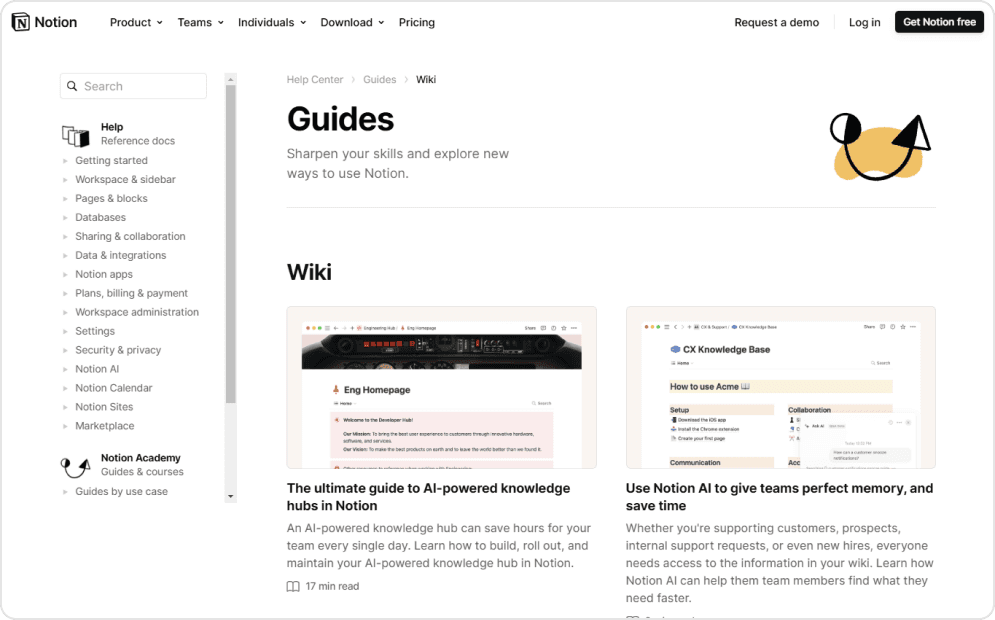
- Databases: Notion creates a database within the Wiki, where users can track projects, tasks, and team information.
- Collaboration: The Wiki supports collaboration by allowing team members to leave comments, suggest edits, and work together in real-time, improving communication and teamwork.
- Search Functionality: The search feature allows users to find specific pages or content quickly, ensuring easy access to information when needed.
In short, the Notion Wiki is a powerful tool for teams to manage knowledge and collaborate efficiently, making it easier to stay organized and informed.
2. Database
Notion’s Databases bring a whole new flexibility to organizing and managing information. Designed for individual users and teams, this feature lets you set up data in customizable views, such as tables, boards, lists, calendars, and galleries.
Each entry can be packed with properties—like text, dates, tags, checkboxes, and even people—allowing for detailed tracking of project tasks, daily notes, or team resources.
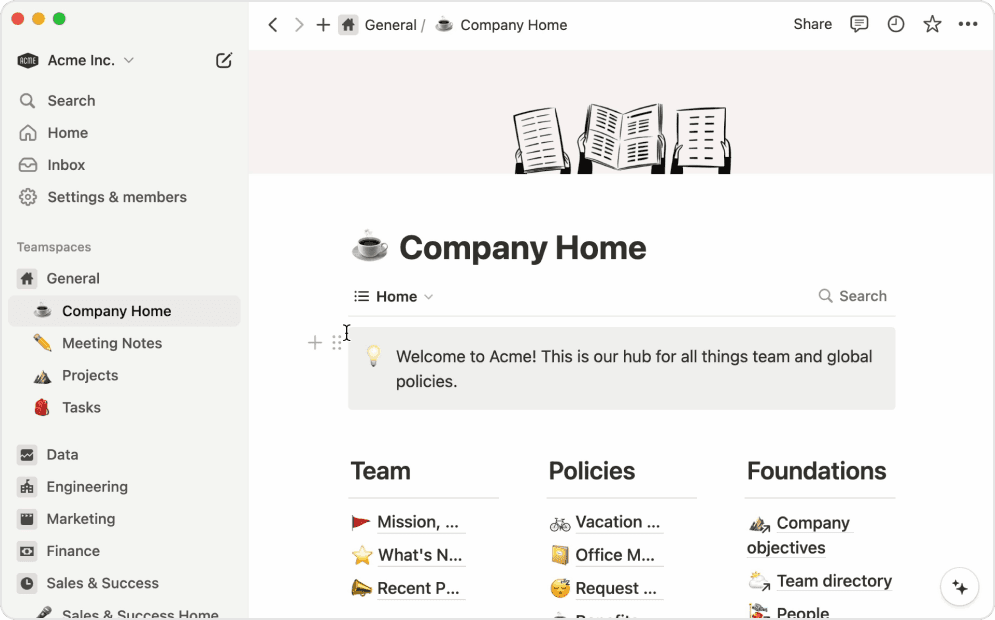
One of the standout aspects is linked databases, which let you display the same data on different Notion pages while applying unique views or filters to each one. This setup keeps information consistent and enables you to zoom in on specific data without duplicate entries.
It can also embed databases within any page in your workspace, linking essential project tasks or important notes directly into your core Notion pages.
With real-time collaboration, team members can easily add, edit, and comment on entries, making information sharing smooth and efficient.
Overall, Notion’s Databases add serious organization power to your productivity toolkit, letting you keep track of everything in one adaptable space.
3. Integration
Notion’s Integrations enhance its functionality by connecting seamlessly with various apps, improving collaboration, and streamlining workflows.
With basic native integrations and third-party tools, you can sync Notion with popular platforms like Google Drive, Slack, and Trello, ensuring all your work remains organized across different tools.
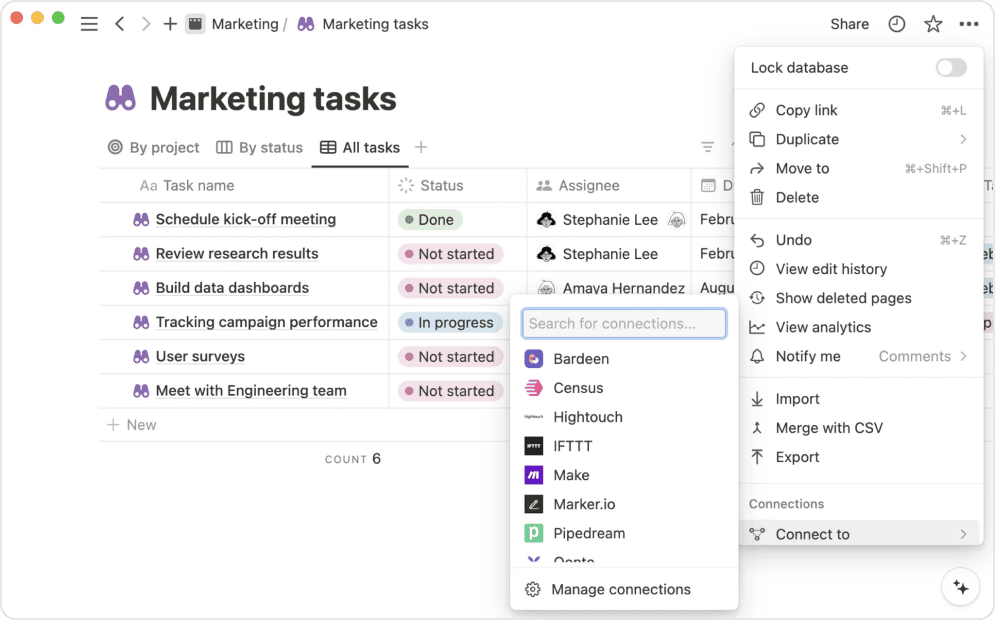
Notion offers integrations with apps like Google Calendar for project management-related tasks, allowing you to track deadlines and set reminders within your workspace.
Additionally, it is required to rely on Zapier since Notion does not offer native integration services.
Get monday.com set up by TaskRhino’s experts today!
No more delays—let us handle the setup while you focus on what matters most.
4. Project Template
Notion’s Project Templates simplify project setup by offering ready-made frameworks personalized to different needs, such as task management, content calendars, and team roadmaps. These templates have built-in features to streamline productivity, including customizable task properties, timeline views, and Kanban boards for tracking progress.
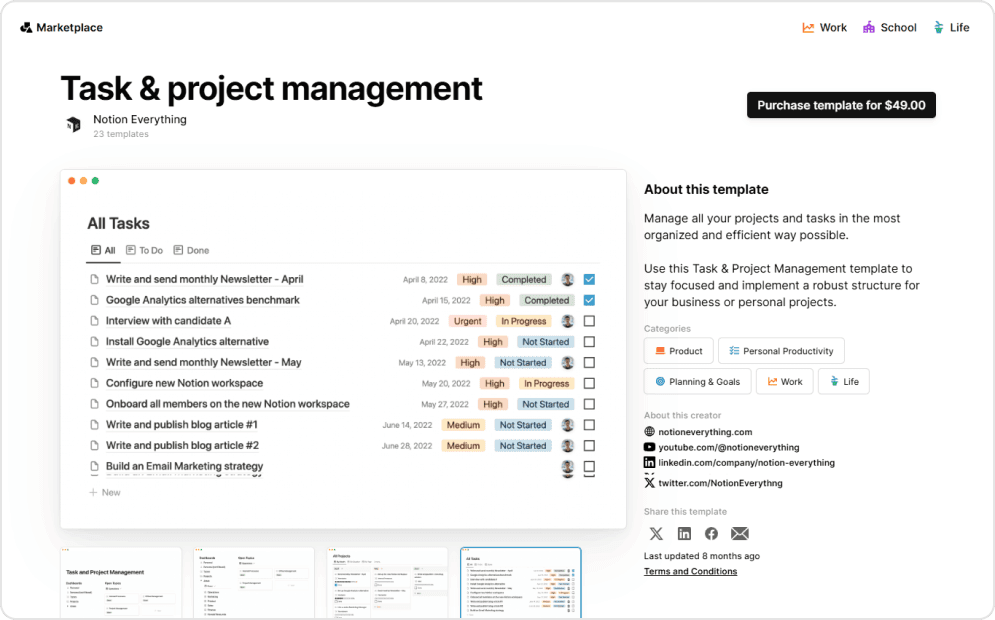
Each template is fully adaptable—users can add tags, due dates, and priority levels and assign team members to tasks. Notion’s project templates also support linked databases, so you can easily sync tasks across various pages for a cohesive workflow without duplication.
Additional features like reminders, file attachments, and comments make collaboration more efficient, while views like calendar and board modes let you choose the layout that best matches your workflow.
Using Notion’s project templates saves time and provides consistency across projects, helping teams stay organized and aligned. Whether for individual use or team projects, these templates bring a flexible structure that allows you to focus more on execution and less on setup, making them a valuable resource for efficient project management.
5. Notion AI
Notion AI offers many smart workspace features, adding a tech-driven edge that increases productivity. With Notion AI, you can effortlessly locate media stored across your connected apps, quickly pulling in images, videos, and files without skipping a beat.
The AI can also generate content on demand, giving you quick drafts and summaries that save you time and effort. Its image analysis feature can pick out details and offer insights. It taps into the depth of GPT-4 and Claude to bring valuable information into your notes—turning your workspace into an almost research-ready hub.
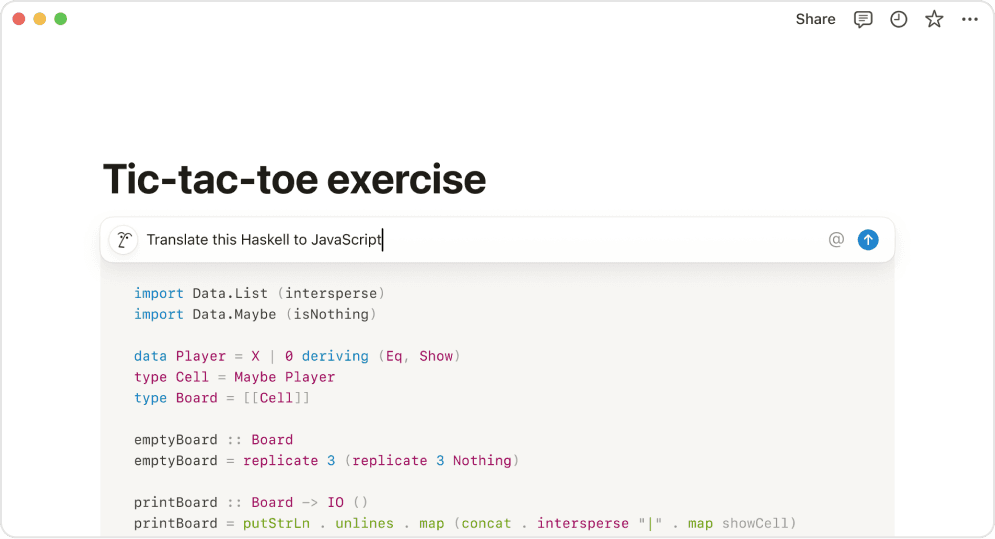
Then there’s the language-translation tool, which supports 10+ languages, keeping your projects accessible and ready for a global audience. For anyone working with international clients or multilingual teams, it’s a serious plus.
Yet, for all these features, some users find Notion AI a bit overhyped. Notion is well-known as a note-taking app, but the AI turn can be considered a feature that will only be handy for some users. For those who prefer a more personal touch, relying so much on AI may feel like it’s taking away as much as it’s adding.
Yes, it’s impressive, but many functions—like media management and translation—are often considered necessities in a workspace tool.
6. Notion Calendar
Notion’s Calendar is one of the most practical features for scheduling and organizing tasks, events, and deadlines in one place. It’s fully customizable, so you can set up different views based on what suits your workflow—whether that’s a weekly, monthly, or even timeline layout.
You can drag and drop tasks, update due dates, and add notes to keep everything organized and accessible.
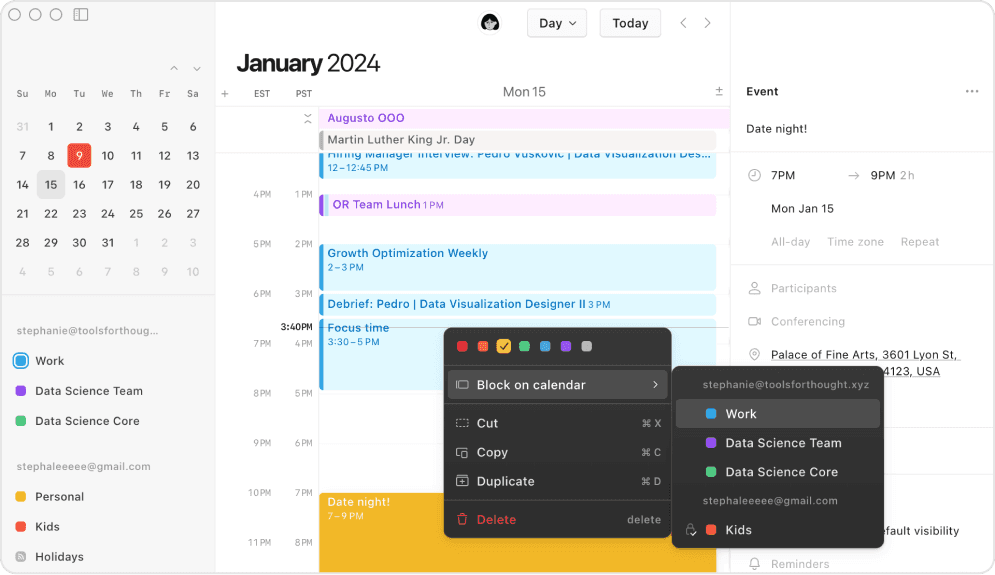
The calendar integrates with Notion’s other apps, so events can automatically link to relevant tasks or projects.
For teams, it’s helpful to keep everyone on the same page without switching apps constantly.
However, some users find that Notion’s calendar lacks the advanced scheduling capabilities of dedicated calendar apps, especially regarding automated reminders or syncing across multiple calendars.
Notion’s calendar may feel too basic for those needing an ultra-robust scheduling system.
Overall, Notion’s core features make it a flexible choice for various workflows, from note-taking to project management. It brings essential tools into one platform, but the value of these features depends largely on how much customization and adaptability you need.
Last but not least & one of the most deciding factors when choosing any tool is – pricing.
Notion offers a range of plans personalized to different needs, from solo users to enterprise teams, each packed with unique features.
How Much Does Notion Cost?
While browsing the pricing plans, remember that access to Notion AI requires additional charges, even for some paid plans, which may influence your choice.
Here’s a breakdown of the available plans and what each one offers:
| Plan | Ideal for | Price | What does it offer? |
|---|---|---|---|
| Free Plan | Individuals | 0 | – Basic Notes – Task Management – Limited File Uploads – 7-day Page History – Integrations with Simple Database |
| Personal Plan | Power users | $4/Monthly | – Unlimited Blocks – 30-day Page History – Priority Support – Notion AI (Paid Add-on) |
| Team | Small teams | $8/Monthly | – Shared Team Workspace – Unlimited Guests – Admin Tools- Notion AI (Paid Add-on) |
| Enterprise Plan | Large Teams | Custom Pricing | – Dedicated Support – Advanced Permissions – Security features – Notion AI (Paid Add-on) |
*The pricing mentioned above is per user.
Notion is an incredible tool that combines organization and creativity in one adaptable workspace. With tools like the Web Clipper, users can capture and save useful online content directly to their Notion pages, keeping everything they need in one place.
Additionally, Notion’s range of templates, including ones crafted to support individuals with ADHD, demonstrates its commitment to inclusivity and personal productivity.
While Notion offers impressive features, from flexible databases to integrations, it has limitations. Relying heavily on AI for tasks like generating content and translating can feel excessive for users looking for a straightforward workflow.
Ultimately, Notion is a valuable option for those willing to invest time in exploring its many features—but for those prioritizing simplicity and a quicker setup, exploring alternatives might make more sense.
If you’re looking for a more advanced project management option with AI integration, then monday.com is worth considering.
Plus, TaskRhino offers expert monday consultancy services to help you implement and optimize monday.com for your team’s specific needs, ensuring maximum productivity and efficiency.
Ready to Level Up Your Project Management Experience?
Get expert guidance to seamlessly implement and maximize the power of monday.com in your business.
Frequently Asked Questions
What are the disadvantages of the Notion app?
Notion is a powerful tool, but it has a few downsides. Its steep learning curve makes it time-consuming for new users to get accustomed to its features, like creating databases and adding custom fields. Additionally, while it’s versatile for project management activities, Notion can feel overwhelming when setting up and maintaining complex projects. Offline functionality is limited, so you’ll need internet access for full use. Also, for teams requiring advanced project tracking or automation, Notion may lack some features in dedicated project management tools.
Is there a better app than Notion?
Whether there’s a “better” app than Notion depends on your needs. Notion combines note-taking, task tracking, and database management in one platform, which makes it highly flexible. However, for users specifically focused on project management features like monday.com or Trello offer streamlined workflows and advanced features like automation, due dates, and project progress tracking.
Does Notion work offline?
Yes, But Notion has limited offline functionality. You can view pages you’ve accessed recently, but creating new pages, databases, or changes typically requires an internet connection. This can disadvantage those who need access to their entire workspace offline. Notion’s reliance on being online can impact productivity when working remotely or in areas with poor connectivity.
Does Notion integrate with monday?
Currently, Notion doesn’t offer a native integration with monday.com. However, you have two effective options: You can opt to consult TaskRhino, a monday.com integration expert, for a seamless, personalized connection or use third-party automation tools like Zapier. While Zapier can handle basic integrations, TaskRhino offers customized solutions that suit your unique workflow needs.
Editor's Choice
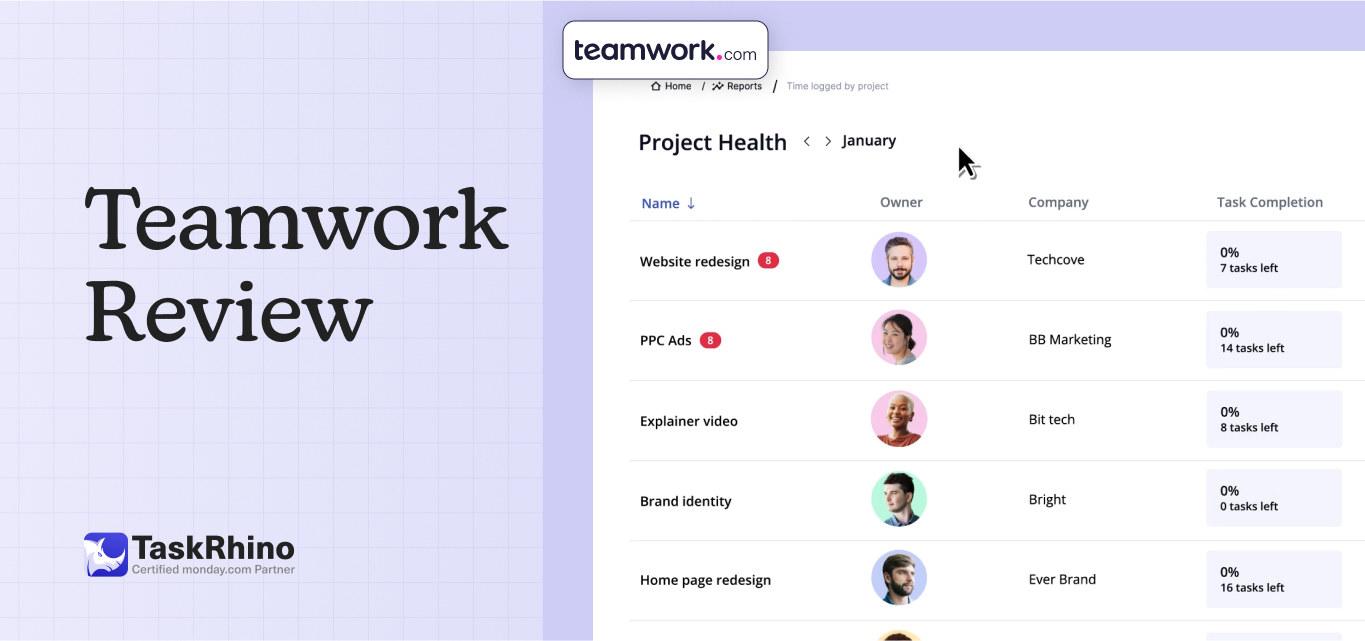
Teamwork Review: The Ultimate Tool for Efficient Project Management

Asana Review 2025: Complete Features, Pricing & User Experience Analysis

Wrike Review 2025: Comprehensive Analysis & User Guide
